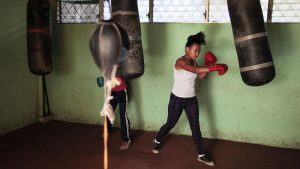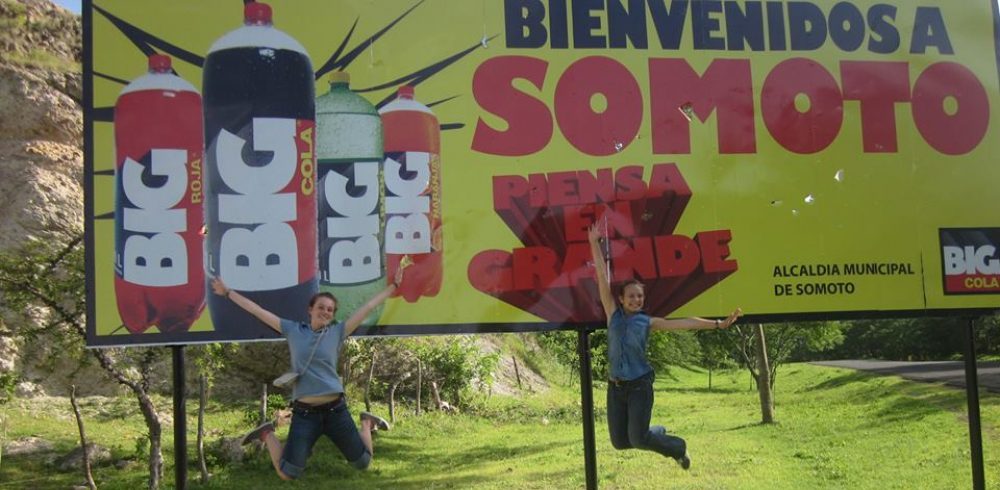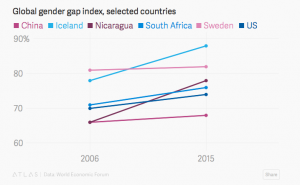The Status of Women in Nicaragua
 For our final project, Roshni, Katie, and I explored gender equality in Nicaragua. Our research was inspired by the article “Nicaragua, the world’s unlikely champion of gender equality.” As the title suggests, we were confused how Nicaragua seemed to be rapidly closing the gender gap while being the second poorest country in Central America and dominated by machismo culture. As a Spanish major, I have studied gender and sexuality in Latin America in many classes. However, Nicaragua seemed an exceptional case. What was their secret? Was the improvement real?
For our final project, Roshni, Katie, and I explored gender equality in Nicaragua. Our research was inspired by the article “Nicaragua, the world’s unlikely champion of gender equality.” As the title suggests, we were confused how Nicaragua seemed to be rapidly closing the gender gap while being the second poorest country in Central America and dominated by machismo culture. As a Spanish major, I have studied gender and sexuality in Latin America in many classes. However, Nicaragua seemed an exceptional case. What was their secret? Was the improvement real?
Below is a graph from that article showing the rapid improvement of Nicaragua on the gender gap index. Some of the selected countries on this graph make sense. Iceland is renowned for being a progressive country. Yet China is also ranked consistently high? And Nicaragua rocketed past the United States. We wanted to understand where these numbers were coming from.
We came up with the following question to guide our research: Nicaragua appears to be rapidly closing the gender gap. Yet for education, healthcare, economic opportunities, political representation, and legal rights we question how truly equal women are to men.
Below is a summary of our findings in each of these fields. In this powerpoint there is more information and details.
Education: In terms of gender equality, more Nicaraguan women than men obtain an education. However, the absolute percentages of education attainment for females and males in Nicaragua is low.
Healthcare: The overall health of women is greatly affected by maternal health. By nature, this creates great disparities in the general health of men and women.
Economic Opportunities: It appears on the surface that Nicaragua offers equal economic opportunity, but how can this be true if the underlying social norms keep women at home?
Political Representation: Women are more represented in politics in Nicaragua than many “developed” countries. But representation does not mean political power.
Legal Rights: Traditional family values are prioritized women’s rights.
While Nicaragua has a better gender gap index than the United States, our research showed that it is still much easier to be a woman in America. Nicaraguan women obtain more education than men and have near equal political representation—yet these statistics do not translate into tangible improvements in their lives. For example, much of Nicaragua is still based on a traditional agricultural economy with women working in the home and men in the fields. Women’s slim educational advantage thus does not translate into job opportunities. With education levels so low in Nicaragua, gender equity does not necessarily improve lives. This raises the question, if we want to improve the lives of women in Nicaragua, should we focus specifically on gender equality or generally improving the Nicaraguan economy? Or will gender equality lead to economic improvement?
Finally, in Nicaragua Katie and I will interview women (hopefully along with men) to learn about their perspective on gender equality. As we learned over the course of our research, published statistics and numbers can be very deceiving and not represent the truth of gender equality. Only by talking to Nicaraguans will we be able to truly learn what it means to be a women in Nicaragua.
The following questions address each the six fields we explored:
- If a women were to be physically or emotionally abused by her spouse, are there any options?
- What do women use for contraception here?
- If a girl wanted to go to school, is there anything stopping her?
- What were the expectations that your family and your community had of you when you were growing up?
- What rights do you feel you have as woman?
- How does the government represent you as a woman?

